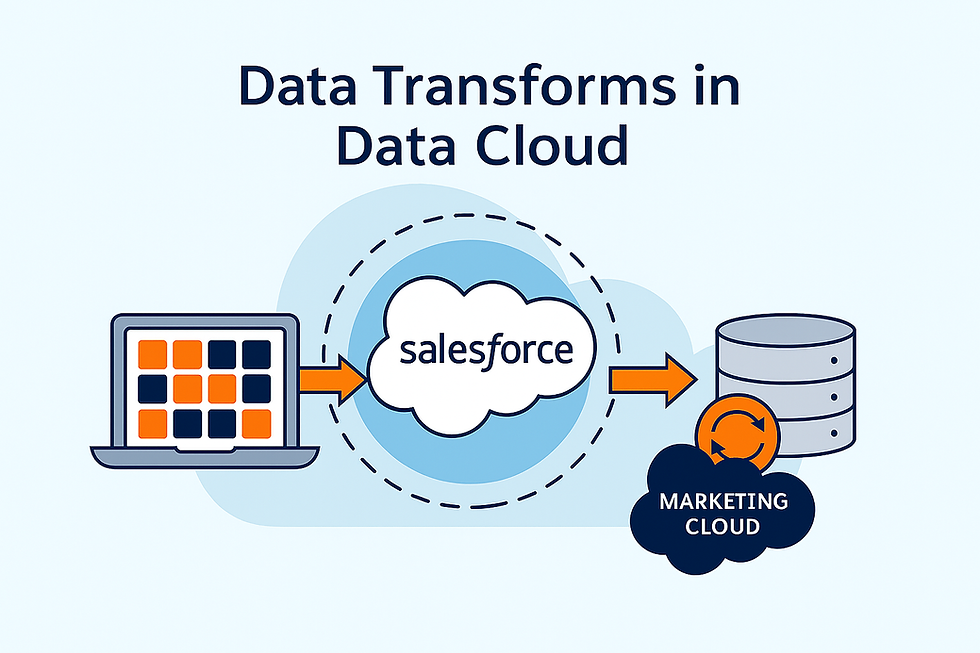Marketing Cloud Next: Your Strategic Bridge to the Future of Marketing
- sfmcstories
- Jun 22, 2025
- 4 min read
The world of digital marketing is evolving rapidly, and Salesforce is making sure its platform evolves with it. With the announcement of Marketing Cloud Next at Connections 2025 (CNX '25), Salesforce has made it clear: the future of marketing is agentic, intelligent, CRM-native, and real-time.
But this isn’t just a feature update or a UI refresh. It’s a strategic repositioning of Salesforce’s marketing ecosystem—a bold move that converges products, simplifies user experiences, and unlocks the power of AI for marketers like never before.
Let’s break down what Marketing Cloud Next is, what it means for you, and how to get ready. *This post is purely my POV, expected to change.
What Is Marketing Cloud Next?
Marketing Cloud Next is the new umbrella name for Salesforce’s marketing products built on the Salesforce Core platform. It combines:
A modern, unified Lightning-based UI
Real-time data segmentation with Data Cloud
Campaign creation and optimization powered by Agentforce, Salesforce’s next-gen AI engine
It brings together both Marketing Cloud Growth Edition and Advanced Edition, while also transforming legacy products like:
Interaction Studio → Salesforce Personalization
Datorama → Marketing Intelligence
MC Advertising → Ad Audiences
And one major shift: Einstein is out. Agentforce is the new name for Salesforce’s AI strategy.

Built for the Marketer Next
Marketing Cloud Next is not just a product update—it’s a shift in how marketing work gets done.
Here’s how it changes the marketer’s world:
1. Unified Interface Across CRM
Forget the days of hopping between tools like Pardot, Journey Builder, and Datorama. Marketing Cloud Next brings everything together under one UI, powered by Lightning, making it easier to align Sales, Service, and Marketing teams.
2. Agentforce-Powered Campaign Creation
With Agentforce, marketers can now:
Input a simple campaign brief
Let AI generate a multi-step, multi-channel journey
Continuously optimize creative, copy, audiences, and performance
This brings speed, scale, and intelligence into campaign operations—freeing marketers to focus on strategy and storytelling.
3. Real-Time Data Activation
All segmentation and targeting is now powered by Data Cloud, enabling:
Always-fresh audiences
Contextual personalization
Real-time response to customer behaviors
Say goodbye to static lists and hello to dynamic audiences that move as fast as your customers do.
Not Migration. Convergence.
One of the most thoughtful moves from Salesforce is the idea of convergence over migration.
For Existing Marketing Cloud Engagement (MCE) Users:
You can continue to use tools like Email Studio and Journey Builder.
At the same time, start experimenting with Flows, Data Cloud segments, and Agentforce capabilities.
New features like CRM Calendar planning, marketing dashboards, and AI assistance are already becoming available.
For Pardot / MCAE Users:
You’ll receive free Marketing Cloud Next licenses, tier-matched to your current subscription.
No forced switch, but you can use both in parallel—testing and comparing.
The architecture encourages gradual adoption without disruption. It’s about “Keep what works. Add what’s Next.”

What Has Changed?
Here’s a quick comparison of what’s evolving:
Feature Area | Legacy Marketing Cloud | Marketing Cloud Next |
User Interface | Separate UIs (Pardot, MCE, etc.) | Unified Lightning-based interface |
AI Engine | Einstein | Agentforce (AI agents that act and optimize) |
Data Segmentation | Lists & Data Extensions | Real-time, connected Data Cloud segments |
Campaign Execution | Manual builds via Journey Builder | AI-generated campaigns from briefs |
Personalization | AMPscript & rules | Agentic, dynamic, real-time personalization |
Reporting & Analytics | Datorama, manual exports | Marketing Intelligence inside CRM |
How to Start the Transition
You don’t need to flip a switch. Here’s how to approach the transition in stages:
✅ Step 1: Start with Data Cloud
Set up connectors and sync key data into Data Cloud. Build segments and test real-time engagement.
✅ Step 2: Explore Agentforce
Try campaign co-piloting with Agentforce. Let it suggest subject lines, audiences, and timing—and then take over routine tasks.
✅ Step 3: Shift Workflows to Flows
Instead of manually building Journeys, start leveraging Flows for campaign orchestration, scheduling, and branching logic.
✅ Step 4: Sync Reporting with CRM
Move your dashboards to Marketing Intelligence, embedded inside Salesforce. Analyze campaigns without jumping between platforms.
Why This Matters for You
The shift to Marketing Cloud Next is about more than just tools. It’s about:
Becoming AI-fluent: Working with agents, not just automations
Operating within CRM: Shared views, common data, consistent logic
Owning the full customer journey: Across email, SMS, WhatsApp, web, and ads
Being faster and more strategic: Campaigns that adapt in real time
In other words, it's about becoming a Marketer Next.
Final Thoughts: The Future Is Now
Marketing Cloud Next isn’t something to fear—it’s something to explore. It gives us a path to modern marketing that’s data-informed, AI-assisted, and CRM-aligned.
And Salesforce is making the journey smoother than expected: no rip-and-replace, no lost progress—just convergence.
“It won’t be easy. It won’t be fast. But it will be the future.”
Now’s the time to build your roadmap, skill up, and start converging.








Comments